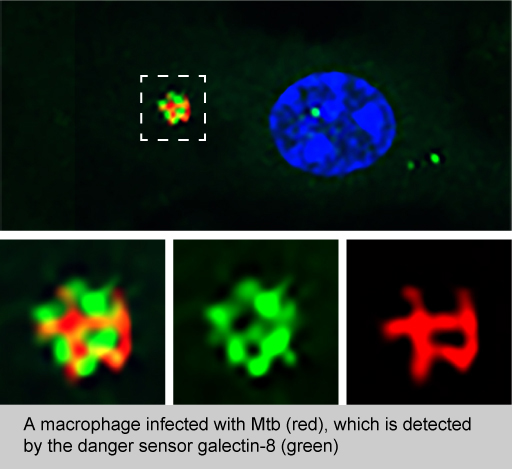
Samantha Bell, Ph.D.
Assistant Professor of Microbiology, Biochemistry & Molecular Genetics
samantha.l.bell@rutgers.edu | View CV
+1-973-854-3366
room W450 F
The Bell Lab studies host-pathogen interactions between macrophages and Mycobacterium tuberculosis (Mtb), the bacterium that causes tuberculosis (TB). Mtb causes ~10 million new infections each year and kills ~1.5 million people annually, making it a major threat to world public health. We probe the interface between the host and the bacterium using bacterial genetics, host genetics, cell biology, biochemistry, molecular biology, immunology, and in vivo infection approaches. We investigate how macrophages—the first line of defense against pathogens like Mtb—detect, respond to, and control infection. We are especially interested in identifying the “danger signals” sensed by macrophages upon Mtb infection, characterizing the downstream pathways that kill Mtb or worsen infection, and defining the regulation and resolution of these potent immune responses. In previous studies, we’ve identified cGAS as the cytosolic DNA sensor that detects Mtb DNA in infected macrophages and induces a type I interferon response, which is characteristic of active TB infections. We’ve also identified galectin-8 as a sensor of the phagosome damage that Mtb causes inside a macrophage, and galectin-8’s interaction with the adapter TAX1BP1 helps macrophages target Mtb to autophagosomes for killing. We also investigate how Mtb uses its virulence factors to survive in a macrophage and establish infection. We’re focusing on Mtb’s many secreted effector proteins to understand what proteins are secreted into a macrophage, when they are secreted, what host pathways they target, how they mechanistically manipulate host cell biology, and how they ultimately impact infection outcomes. Ultimately, we hope to leverage our understanding of the molecular interface between macrophages and Mtb to develop more effective therapies for TB.
Vail KJ, da Silveira BP, Bell SL, Cohen ND, Bordin AI, Patrick KL, Watson RO (2021) The opportunistic intracellular bacterial pathogen Rhodococcus equi elicits type I interferon by engaging cytosolic DNA sensing in macrophages. PLoS Pathog 17: e1009888. PMI: 34473814
Lei Y, Guerra Martinez C, Torres-Odio S, Bell SL, Birdwell CE, Bryant JD, Tong CW, Watson RO, West LC, West AP (2021) Elevated type I interferon responses potentiate metabolic dysfunction, inflammation, and accelerated aging in mtDNA mutator mice. Sci Adv 7. PMI: 34039599
Bell SL, Lopez KL, Cox JS, Patrick KL, Watson RO (2021) Galectin-8 Senses Phagosomal Damage and Recruits Selective Autophagy Adapter TAX1BP1 To Control Mycobacterium tuberculosis Infection in Macrophages. mBio 12: e0187120. PMI: 34225486
Weindel CG, Bell SL, Vail KJ, West KO, Patrick KL, Watson RO (2020) LRRK2 maintains mitochondrial homeostasis and regulates innate immune responses to Mycobacterium tuberculosis. Elife 9. PMI: 32057291
Hoffpauir CT, Bell SL, West KO, Jing T, Wagner AR, Torres-Odio S, Cox JS, West AP, Li P, Patrick KL, Watson RO (2020) TRIM14 Is a Key Regulator of the Type I IFN Response during Mycobacterium tuberculosis Infection. J Immunol 205: 153-167. PMI: 32404352
Zhao B, Du F, Xu P, Shu C, Sankaran B, Bell SL, Liu M, Lei Y, Gao X, Fu X, Zhu F, Liu Y, Laganowsky A, Zheng X, Ji JY, West AP, Watson RO, Li P (2019) A conserved PLPLRT/SD motif of STING mediates the recruitment and activation of TBK1. Nature 569: 718-722. PMI: 31118511
Patrick KL, Bell SL, Weindel CG, Watson RO (2019) Exploring the “Multiple-Hit Hypothesis” of Neurodegenerative Disease: Bacterial Infection Comes Up to Bat. Front Cell Infect Microbiol 9: 138. PMI: 31192157
Penn BH, Netter Z, Johnson JR, Von Dollen J, Jang GM, Johnson T, Ohol YM, Maher C, Bell SL, Geiger K, Golovkine G, Du X, Choi A, Parry T, Mohapatra BC, Storck MD, Band H, Chen C, Jager S, Shales M, Portnoy DA, Hernandez R, Coscoy L, Cox JS, Krogan NJ (2018) An Mtb-Human Protein-Protein Interaction Map Identifies a Switch between Host Antiviral and Antibacterial Responses. Mol Cell 71: 637-648 e635. PMI: 30118682
Patrick KL, Wojcechowskyj JA, Bell SL, Riba MN, Jing T, Talmage S, Xu P, Cabello AL, Xu J, Shales M, Jimenez-Morales D, Ficht TA, de Figueiredo P, Samuel JE, Li P, Krogan NJ, Watson RO (2018) Quantitative Yeast Genetic Interaction Profiling of Bacterial Effector Proteins Uncovers a Role for the Human Retromer in Salmonella Infection. Cell Syst 7: 323-338 e326. PMI: 30077634
Patrick KL, Bell SL, Watson RO (2016) For Better or Worse: Cytosolic DNA Sensing during Intracellular Bacterial Infection Induces Potent Innate Immune Responses. J Mol Biol 428: 3372-3386. PMI: 27139640
Watson RO, Bell SL, MacDuff DA, Kimmey JM, Diner EJ, Olivas J, Vance RE, Stallings CL, Virgin HW, Cox JS (2015) The Cytosolic Sensor cGAS Detects Mycobacterium tuberculosis DNA to Induce Type I Interferons and Activate Autophagy. Cell Host Microbe 17: 811-819. PMI: 26048136


